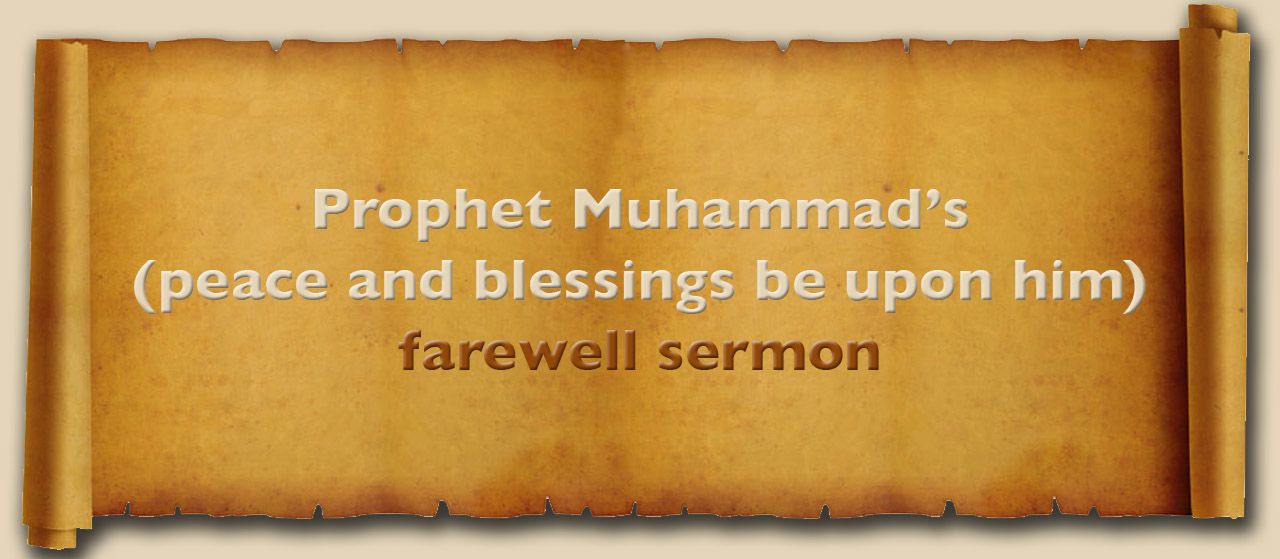Prophet Muhammad’s (peace and blessings be upon him) farewell sermon / خطبة الوداع, Khutbatul-Wada’
9 DhulHijjah 10 AH (9 March 632) at Mount Arafat
Prophet Muhammad (peace and blessings be upon him) undertook his farewell pilgrimage in the year 10 A.H. His farewell pilgrimage to Mecca is one of the most significant historical events in the minds of Muslims, for it was the first and last pilgrimage performed by Prophet Muhammad, as well as being the model for performing the fifth pillar of Islam, Hajj.
Prophet Muhammad’s final sermon was delivered during the Hajj of the year 632 C.E., the ninth day of Dhul Hijjah, the 12th month of the lunar year, at Arafat, the most blessed day of the year. There were numerous Muslims present with the Prophet during his last pilgrimage when he delivered his last sermon.
Even today, the last sermon of Prophet Muhammad (peace be upon him) is passed to every Muslim in every corner of the world through all possible means of communication. Muslims are reminded of it in mosques and in lectures. Indeed the meanings found in this sermon are astounding, touching upon some of the most important rights Allah Almighty has over humanity, and humanity has over each other. Though the Prophet’s soul (peace be upon him) has left this world, his words are still living in our hearts.
After praising and thanking Allah, Prophet Muhammad (peace and blessings be upon him) said:
“O People, lend me an attentive ear, for I know not whether after this year, I shall ever be amongst you again. Therefore listen to what I am saying to you very carefully and TAKE THESE WORDS TO THOSE WHO COULD NOT BE PRESENT HERE TODAY.
O People, just as you regard this month, this day, this city as sacred, so regard the life and property of every Muslim as a sacred trust. Return the goods entrusted to you to their rightful owners. Hurt no one so that no one may hurt you. Remember that you will indeed meet your Lord, and that He will indeed reckon your deeds. Allah has forbidden you to take usury (interest); therefore all interest obligations shall henceforth be waived. Your capital, however, is yours to keep. You will neither inflict nor suffer any inequity. Allah has judged that there shall be no interest and that all the interest due to Abbas ibn Abdul Muttalib (Prophet’s uncle) shall henceforth be waived…
Beware of Satan, for the safety of your religion. He has lost all hope that he will ever be able to lead you astray in big things, so beware of following him in small things.
O People, it is true that you have certain rights with regard to your women, but they also have rights over you. Remember that you have taken them as your wives only under Allah’s trust and with His permission. If they abide by your right then to them belongs the right to be fed and clothed in kindness. Do treat your women well and be kind to them for they are your partners and committed helpers. And it is your right that they do not make friends with any one of whom you do not approve, as well as never to be unchaste.
O People, listen to me in earnest, worship Allah, perform your five daily prayers (salah), fast during the month of Ramadan, and give your wealth in zakat (almsgiving). Perform Hajj if you can afford it.
All mankind is from Adam and Eve, an Arab has no superiority over a non-Arab nor a non-Arab has any superiority over an Arab; also a white has no superiority over black nor does a black have any superiority over a white except by piety and good action. Learn that every Muslim is a brother to every Muslim and that the Muslims constitute one brotherhood. Nothing shall be legitimate to a Muslim which belongs to a fellow Muslim unless it was given freely and willingly. Do not, therefore, do injustice to yourselves.
Remember, one day you will appear before Allah and answer for your deeds. So beware, do not stray from the path of righteousness after I am gone.
O People, no prophet or apostle will come after me and no new faith will be born. Reason well, therefore, O People, and understand words which I convey to you. I leave behind me two things, the QURAN and my example, the SUNNAH and if you follow these you will never go astray.
All those who listen to me shall pass on my words to others and those to others again; and may the last ones understand my words better than those who listen to me directly. Be my witness, O Allah, that I have conveyed your message to your people”.
Prophet Muhammad’s (peace and blessings be upon him) farewell sermon.



whoah this blog is great i love reading your articles. Stay up the great work!
You understand, a lot of people are searching
around for this information, you could help them greatly.